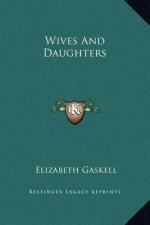‘It is quite true!’ she said to him. ’I was not attending: you see I don’t know even the A B C of science. But, please, don’t look so severely at me, even if I am a dunce!’
‘I did not know—I did not mean to look severely, I am sure,’ replied he, not knowing well what to say.
‘Cynthia is not a dunce either,’ said Mrs. Gibson, afraid lest her daughter’s opinion of herself might be taken seriously. ’But I have always observed that some people have a talent for one thing and some for another. Now Cynthia’s talents are not for science and the severer studies. Do you remember, love, what trouble I had to teach you the use of the globes?’
’Yes; and I don’t know longitude from latitude now; and I’m always puzzled as to which is perpendicular and which is horizontal.’
‘Yet, I do assure you,’ her mother continued, rather addressing herself to Osborne ’that her memory for poetry is prodigious. I have heard her repeat the “Prisoner of Chillon” from beginning to end.’
‘It would be rather a bore to have to hear her, I think,’ said Mr Gibson, smiling at Cynthia, who gave him back one of her bright looks of mutual understanding.
’Ah, Mr. Gibson, I have found out before now that you have no soul for poetry; and Molly there is your own child. She reads such deep books— all about facts and figures: she’ll be quite a blue-stocking by and by.’
‘Mamma,’ said Molly, reddening, ’you think it was a deep book because there were the shapes of the different cells of bees in it; but it was not at all deep. It was very interesting.’
‘Never mind, Molly,’ said Osborne. ‘I stand up for blue-stockings!’
‘And I object to the distinction implied in what you say,’ said Roger. ’It was not deep, ergo, it was very interesting. Now, a book may be both deep and interesting.’
’Oh, if you are going to chop logic and use Latin words, I think it is time for us to leave the room,’ said Mrs. Gibson.
‘Don’t let us run away as if we were beaten, mamma,’ said Cynthia. ’Though it may be logic, I, for one, can understand what Mr. Roger Hamley said just now; and I read some of Molly’s book; and whether it was deep or not I found it very interesting—more so than I should think the “Prisoner of Chillon” now-a-days. I’ve displaced the Prisoner to make room for Johnnie Gilpin as my favourite poem.’




